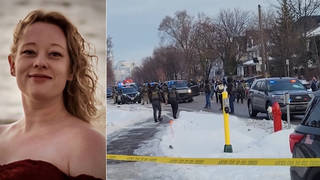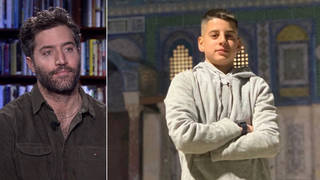
As Israel and Hamas exchange living and dead captives as part of a U.S.-backed ceasefire agreement, questions are growing about how sustainable the truce is and whether the two sides will progress to the second and third stages of the plan.
“My family is very happy that the families of other hostages that have been returned, dead and alive, are reaching some degree of closure,” says Middle East historian Joel Beinin, whose Israeli niece, Liat Beinin Atzili, was held captive in Gaza for 54 days after she was taken by Hamas militants on October 7, 2023, while her husband Aviv was killed. The family’s story is the focus of a new documentary, Holding Liat.
“All of the rest of the 20-point plan is very dubious, and I have grave doubts about whether any of the rest of it will actually be implemented,” says Beinin, who also discusses one-sided Western media coverage of the Israeli-Palestinian conflict and how he came to “abandon Zionism” despite having family in Israel.
Transcript
AMY GOODMAN: This is Democracy Now!, democracynow.org. I’m Amy Goodman.
Pressure is growing in Israel to allow more aid into Gaza as the ceasefire continues to hold. On Tuesday, Israel told the United Nations it would allow only half the 600 daily aid trucks called for under the deal, accusing Hamas of moving too slowly to release the bodies of dead hostages.
On Tuesday night, Hamas handed over four bodies. Israel said three of the bodies had been identified, but the fourth didn’t match any of the known hostages.
Meanwhile, Israel has returned the remains of 45 deceased Palestinians. Health officials in Gaza say the bodies arrived with their hands and legs cuffed. In statement, Nasser Hospital said, quote, “Some are blindfolded, and there are signs of gunshot wounds in some cases, while others have been run over by tanks,” unquote. Israel is believed to hold hundreds of bodies of dead Palestinians.
This comes as negotiations have begun for the second phase of President Trump’s 20-point plan. On Tuesday, Trump threatened the U.S. would disarm Hamas if the group doesn’t do so itself.
PRESIDENT DONALD TRUMP: We have told them we want disarm, and they will disarm. And if they don’t disarm, we will disarm them. And it’ll happen quickly and perhaps violently. But they will disarm.
AMY GOODMAN: We’re joined now by Joel Beinin, professor emeritus at Stanford University, nonresident fellow at DAWN. Joel Beinin has written or edited 12 books, among them, A Critical Political Economy of the Modern Middle East. Professor Beinin is also the uncle of Liat Beinin Atzili, an Israeli hostage who was released after 54 days in Hamas captivity, her husband killed. Joel Beinin is in the new documentary on his niece that’s titled Holding Liat.
We will talk about that in a moment, Professor Beinin. We’ll talk about the incredible ordeal your family has been through. But first, I wanted to get your response to what has unfolded this week, the deal that has been signed, the 20-point Trump plan, in Sharm el-Sheikh, the significance of this deal and what’s happening on the ground, including the hostage release on both sides. You have the 20 hostages, live hostages, released by — released by Hamas, and the nearly 2,000 — some call them hostages, because so many of the Palestinian prisoners, almost all of Palestinians, if not all of the Palestinian prisoners that were taken from Gaza, have never been charged.
JOEL BEININ: Good morning, Amy, and thank you for having me.
The first phase of the deal, the ceasefire, the exchange of captives, which is still underway with regard to the deceased Israeli bodies that Hamas is still in the process of delivering, and the allowance of aid into the Gaza Strip, even though Israel has cut in half the original agreed-upon amount, these are all very welcome things. My family is very happy that the families of other hostages that have been returned, dead and alive, are reaching some degree of closure. All of the rest of the 20-point plan is very dubious, and I have grave doubts about whether any of the rest of it will actually be implemented.
AMY GOODMAN: What do you understand are the key issues of this deal? I mean, on the issue of the return of the dead bodies, I mean, obviously, now in a completely demolished Gaza — I think President Trump referred to it as a kind of demolition zone, that it’s been demolished — they don’t have DNA testing. And I think both sides recognized it was going to be hard for Hamas to identify some of these remains. And according to some reports, there were three bodies that are identified as Israeli hostages. The fourth, it’s believed to be a Palestinian, but, according to sources, not believed to be intentionally passed off, but not clear, because it takes Israel testing the DNA.
JOEL BEININ: That’s right. Hamas has returned so far seven Israeli dead bodies, subtracting the one that turned out not to be Israeli. Four more are supposed to be delivered today. Haaretz reported some days ago that the Israeli government knows that as many as 15 hostages can’t be located, that they understand that Hamas doesn’t know where they are, and Israel doesn’t know what they are. So, almost as many bodies that the Israeli government thinks can be positively located will have been returned by the end of today, if Hamas carries through with returning four more bodies.
Israel is playing with this as it has played with every issue, and this is a good indication of why we should have doubts about whether the rest of the 20-point deal will be carried out, because there is no majority in the Israeli government for a international stabilization force. I doubt very much whether Israel is going to be OK with soldiers from Muslim countries entering the Gaza Strip to ensure security. Israel is not going to be OK with the Palestinian Authority, whether it’s reformed in whatever way they’re supposed to be reformed — nobody has actually specified what that is — that they should take control of Gaza. And the Israeli government is certainly not OK with any kind of move toward establishing a Palestinian state.
And Hamas, for its side, has said that they are willing to give up their offensive arms, such as rocket launchers, and to withdraw from tunnels which have been used for offensive actions, but they’re not willing to give up their side arms and their rifles. So, there’s going to be lots of points for disagreement and, as I said, very likely no agreement on the other points after the — what’s originally been implemented so far.
AMY GOODMAN: One of the great fears of the Israeli hostage families until now has been if Israel, if Netanyahu continues his assault on Gaza, that the hostages would be killed in the bombing, and that issue of the possibility that, like so many thousands of Palestinians buried in the rubble, some of those Israeli hostages might have met the same fate and are buried in the rubble.
JOEL BEININ: There’s very good reason for that fear. About 41 hostages have been killed since October 7th as a result of military action. They’ve either been bombed by Israel or, in one very dramatic case, three of them were shot dead by Israel when they were trying to escape. Hamas has executed some of them, when Hamas feared that Israeli forces were closing in on them. So, it’s almost certainly the case that had the fighting not stopped when it did, the lives of additional hostages would have been put at risk.
AMY GOODMAN: I want to go to the trailer for the feature documentary film Holding Liat. This is the documentary about your niece, your brother’s daughter, Liat Beinin Atzili.
ISRAELI OFFICIAL: [translated] Our intelligence says your daughter Liat is being held by terrorists in the Gaza Strip.
YEHUDA BEININ: [translated] Wait, wait, wait, wait.
CHAYA BEININ: It is so hard not knowing what’s going on with her. My biggest worry is that she’s not with us anymore.
YEHUDA BEININ: We’re being led by crazy people, whether it’s on the Israeli side or whether on the Palestinian side. And the result is always death and destruction.
CHAYA BEININ: Yehuda and I deal with problems differently.
YEHUDA BEININ: The struggle for peace and reconciliation is the best way to respect Liat and Aviv and provide a human side to the story.
NETTA ATZILI: I’m not going to thank them for attacking my parents and murdering my acquaintances.
TAL BEININ: Let’s just figure out where Liat and Aviv are. Let’s just focus on that, Aba.
JOEL BEININ: We want to be supportive of the family. And on the other hand, I’m here, and I disagree politically.
TAL BEININ: Sometimes it’s better to just be quiet, because you know what? For getting Liat and Aviv back, put a yarmulke on your head.
YEHUDA BEININ: No, I’m not going to run away. I’ll stand my ground.
CHAYA BEININ: There’s no way of knowing how much longer this is going to go on.
TAL BEININ: Who’s holding her? Is she in a house? Is she in a cave? Is she being fed? Does she have her glasses? The longer it takes, the harder it is to stay positive.
YEHUDA BEININ: There’s no guarantee that either of them are coming out of this alive.
ISRAELI OFFICIAL: [translated] We just got the list. And unfortunately, Liat is not on today’s list.
AMY GOODMAN: That’s the trailer for Holding Liat, which is available on BBC’s Storyville. This is another clip, that features our guest Joel Beinin’s niece, Liat Atzili. She was one of 16 hostages who were released from Hamas captivity in November 2023.
LIAT BEININ ATZILI: [translated] My thoughts about Israel’s response and what’s happening in Gaza are complex. It’s horrible, truly horrible. People are saying we shouldn’t let humanitarian aid into Gaza. And it’s horrifying to hear. I don’t care that it allows Hamas to keep fighting. People shouldn’t starve to death, no matter who they are. But by the same token, it’s not OK to go into people’s houses and take them hostage, either.
AMY GOODMAN: That’s Liat Beinin Atzili, our guest professor Joel Beinin’s niece. She was released in November of 2023 after 54 days in captivity. She’s an Israeli American citizen. Professor Beinin, Holding Liat, this film, is deeply moving. You’re also in it, where you express your mood, your feelings, both the horror of the hostages being taken and the situation. And if you can talk about Liat and what happened and how you dealt with this through this time, with your very critical view of Israel throughout the last decades of history?
JOEL BEININ: Liat is a history teacher. She lives on Kibbutz Nir Oz. Just recently, she’s moved back in a — to a new house there. She was politically oppositional long before October 7th, my entire Israeli family. My family moved to Israel in 1973, all of them, except for me. They were always left-wing Zionists, and that’s the way I was brought up, too. I lived in Israel for several years before my family moved there in 1973, and came back because, as a result of political struggle against the occupation and support of the Israeli Black Panthers, I came to abandon Zionism. So, that’s been a difference between my family and me for 50 years before October 7th.
Nonetheless, I’m part of the family, and I was deeply shocked to learn that Liat was taken hostage on October 7th along with 250 other Israelis. And the family found out, 12 hours after Liat was released on November 29th, 2023, that her husband Aviv was killed defending their kibbutz on October 7th. So, all of this was pretty traumatic for my family, pretty traumatic for all the people of Israel. And, of course, Israel’s response traumatized the entire population of the Gaza Strip 10 times over.
The family has a certain amount of closure, because we know what — Liat is back. We know what happened to Aviv. There has been a funeral. But I don’t think my family, I don’t think many of the people of Israel, I don’t think the great majority of the people of the Gaza Strip are going to recover from this trauma anytime soon. And since I am skeptical about how the 20-point deal will ever be implemented — I don’t expect it to be — there won’t be much help in resolving the trauma from the political leadership of either Israel or the Palestinians.
AMY GOODMAN: I wanted to end by asking you about the Palestinian prisoners — you might say “hostages” — who’ve been released, up to 2,000, and I referenced this before. It is believed all — if not, almost all — of those that were released to Gaza have never been charged, and held for up to two years. When you saw the buses, both in Ramallah and Gaza, of the people coming off those buses, they were emaciated. They’re wearing heavy sweatshirts that cover some of that, some of them clearly beat up. Some of them can’t walk. Your final comments on that, even as your niece was also held hostage?
JOEL BEININ: So, the Palestinians that have been released so far are in two categories. One thousand and some captives who were held hostage without charge from Gaza — there are 9,000 more Palestinians in Israeli prisons, most of them held without charge. Two hundred and fifty of the Palestinians who were released were serving life sentences for armed attacks on Israelis.
So, it is — the world media focuses on the Israelis. There’s always a serious imbalance in coverage and centering Israel and Israelis, and much less attention to Palestinians. But, of course, Palestinian society, as a whole, is suffering far, far more than Israeli society has ever suffered as a result of the armed clashes, going back all the way to 1948. And that’s something that we in the West don’t tend to have adequate appreciation for.
AMY GOODMAN: Professor Joel Beinin, I want to thank you for being with us, professor emeritus at Stanford University, now nonresident fellow at DAWN. Professor Beinin’s niece, Liat Beinin Atzili, was held by Hamas for 54 days in 2023. There’s a documentary now out on her, titled Holding Liat.
Coming up, we speak with Lindsey Boylan. She became the first of 11 women to publicly accuse her boss, then-New York Governor Andrew Cuomo, of sexual harassment. She’s now supporting Zohran Mamdani for mayor over Cuomo. Back in 20 seconds.
[break]
AMY GOODMAN: Sonny Singh in our Democracy Now! studio.













Media Options